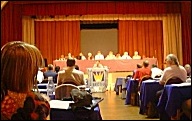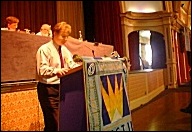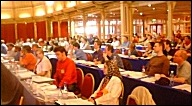BECTU conference backs Labour

|
| Debate at Conference 2001 |
A move to disaffiliate the union from the Labour Party was overwhelmingly defeated in a vote of delegates at the Eastbourne conference.
The vote came after branch representatives and senior union officials defended Labour's policies in the audiovisual and entertainment industries.
Over the first four years of Labour government arts spending had been increased, the BBC licence fee had been pegged above inflation, and tax breaks had been introduced for filmmakers.
Speakers reported that BECTU was already taking advantage of new labour laws that offered unions guaranteed recognition in workplaces, and the Working Time Directive had been implemented without the damaging changes that the Conservatives would have made.

|
| BECTU's affiliation to the Labour Party is defended |
A conference vote to break the link with Labour would, he said, prevent BECTU influencing government policy in favour of its members.
In a separate debate, delegates voted to approve a plan for the union to move its HQ from Central London to Clapham in order to refurbish and rent out its Wardour Street office building.
An increase in subscription payments from freelance members was approved, along with the introduction of a £400 cap on annual fees for any individual member.
A motion calling for all sections of BECTU to demand a 35-hour week was accepted by delegates against the advice off the union's National Executive Committee (NEC). The call for working hours to be put on a par with countries like France will now feature on the bargaining agenda of pay talks with BECTU's employers.

|
| BECTU Branch delegates at Conference |
Delegates were told that a complaint about the current system, under which the President is elected from within the NEC, had been ruled illegal following a complaint by an individual member to the Union Certification Officer.
From next year, BECTU's President will be elected in a postal ballot of all members.
Among other propositions accepted by conference, the new immigration rules which target specified groups like Romanies were condemned as racist, and delegates voted to support the efforts of Russian trades unionists to prevent government interference in TV stations.
Branch representatives welcomed the stakeholder pension scheme which has been established by BECTU and Norwich Union, and praised the union's involvement in skillsformedia, a new on-line training initiative which is due to launch in June.
A date for BECTU's next conference, which will also consider changes to the union's rule book, has not yet been fixed, but it is likely to be held in late Spring 2002.
